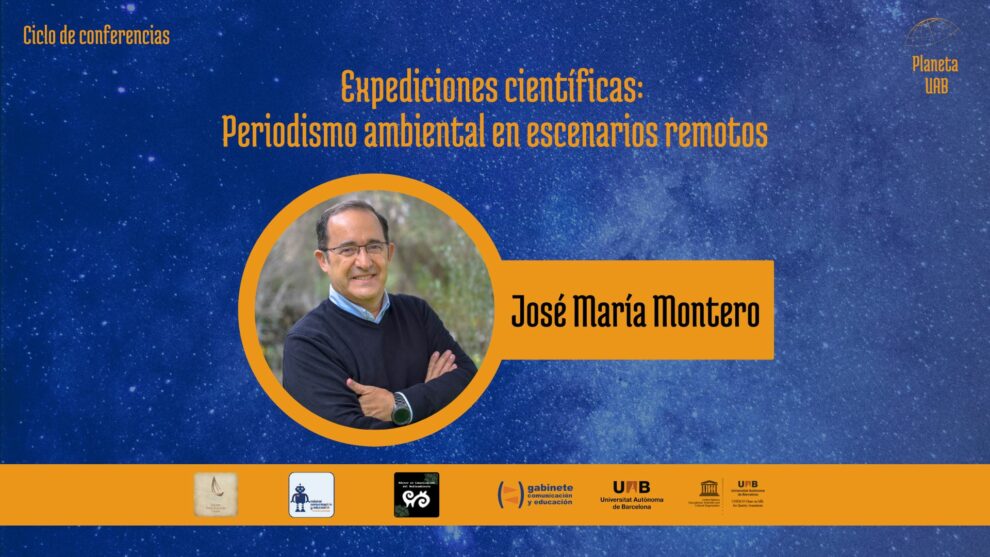José María Montero, a journalist specialising in scientific and environmental information, inaugurated on 14 February the Planeta UAB lecture series, an initiative of the Gabinete de Comunicación y Educación aimed at students of its master’s degrees.
This cycle of conferences is part of the project “Planet UAB: The journey to the other – equals in differences” organised by the Gabinete de Comunicación y Educación during the academic year 2020-2021, with the support of the Solidarity Fund of the Universitat Autònoma de Barcelona, which organised a series of activities and awareness-raising actions based on the concept of the UAB campus as a “planet” and which dealt with major issues such as the culture of peace, sustainability, the environment and interculturality, among others.
Students of the Master’s in Travel Journalism, the Master’s in Environmental Communication and the Master’s in Communication and Education participated in this first session with José María Montero, head of the Environment area in the News Services of Canal Sur Television and director of the programmes “Tierra y Mar” and “Espacio Protegido”. Under the title ‘Environmental journalism in protected spaces’, the journalist shared his experiences in scientific expeditions and analysed the treatment of environmental information in the television industry, reaching the following conclusions:
- There is a growing user demand for environmental information, which is often not met by the media. One example is the treatment of climate change. According to José María Montero, the media treat this complex subject with “infrequency and poor quality”.
- The immediacy that predominates in today’s journalism has deteriorated the quality of environmental information. In this sense, journalists must be aware of reproducing complex information in a way that is decipherable for the recipients, without falling into banality.
- Environmental information needs rest and the television industry is currently driven by the pressures of audiences. Television is tempted to adapt reality to the conditions of the medium and, in this way, often erodes reality.
- It is necessary to generate links of complicity between scientists and communicators.
- Quality environmental journalistic reporting often serves to fill educational “gaps”.
Finally, the journalist emphasised the fundamental dimension of journalism, which has as its environmental objectives “sensitivity, awareness and training of citizens” and which must reach the most diverse audiences, from the most specialised to the general public.
José María Montero (Córdoba, 1963), a graduate in Information Sciences, is a journalist specialising in scientific and environmental information. He has worked since 1981 in the daily press, specialised publications, radio, television and digital media. He is responsible for the Environment area in the News Services of Radio Televisión de Andalucía. Director of the programmes “Espacio Protegido” and “Tierra y Mar” (Canal Sur TV). He is also co-director of the scientific expeditions to Kazakhstan, Mauritania-Senegal, Argentina and Australia-Tasmania (Radio Televisión de Andalucía + Consejo Superior de Investigaciones Científicas) and director of more than twenty nature and popular science documentaries, filmed in Spain, America, Africa, Asia and Oceania. He is the author of the blog “El gato en el jazmín” and half a dozen popular science and environmental books.
The Planeta UAB lecture series will be made up of a total of 20 digital meetings. According to Santiago Tejedor, director of the UAB Communication and Education Office, they will “allow us to talk about the adventure of exploration, discovery and learning that means learning, research and training”. They will address issues related to culture, otherness, health education, the environment, information technologies and interculturality, among others.





